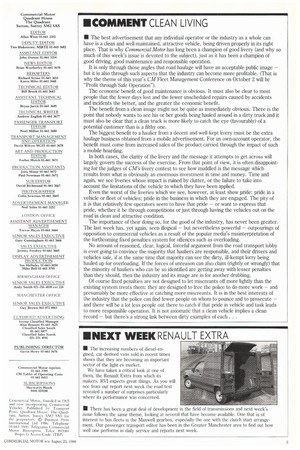MCOMMENT CLEAN LIVING
Page 5

If you've noticed an error in this article please click here to report it so we can fix it.
• The best advertisement that any individual operator or the industry as a whole can have is a clean and well-maintained, attractive vehicle, being driven properly in its right place. That is why Commercial Motor has long been a champion of good livery (and why so much of this week's issue is devoted to the subject), just as it has been a champion of good driving, good maintenance and responsible operation.
It is only through those angles that road haulage will have an acceptable public image — but it is also through such aspects that the industry can become more profitable. (That is why the theme of this year's CM Fleet Management Conference on October 2 will be "Profit through Safe Operation").
The economic benefit of good maintenance is obvious. It must also be clear to most people that the fewer days lost and the fewer unscheduled repairs caused by accidents and incidents the better, and the greater the economic benefit.
The benefit from a clean image might not be quite as immediately obvious. There is the point that nobody wants to see his or her goods being hauled around in a dirty truck and it must also be clear that a clean truck is more likely to catch the eye (favourably) of a potential customer than is a filthy one.
The biggest benefit to a haulier from a decent and well-kept Livery must be the extra haulage business obtained from a mobile advertisement. For an own-account operator, the benefit must come from increased sales of the product carried through the impact of such a mobile hoarding.
In both cases, the clarity of the livery and the message it attempts to get across will largely govern the success of the exercise. From that point of view, it is often disappointing for the judges of CM's livery contest to see how muddled is the message which results from what is obviously an enormous investment in time and money. Time and again, we see liveries whose impact is ruined by clutter, or the failure to take into account the limitations of the vehicle to which they have been applied.
Even the worst of the liveries which we see, however, at least show pride: pride in a vehicle or fleet of vehicles; pride in the business in which they are engaged. The pity of it is that relatively few operators seem to have that pride — or want to express that pride, whether it be through competitions or just through having the vehicles out on the road in clean and attractive condition.
The importance of their doing so, for the good of the industry, has never been greater. The last week has, yet again, seen illogical — but nevertheless powerful — outpourings of opposition to commercial vehicles as a result of the popular media's misinterpretation of the forthcoming fixed penalties system for offences such as overloading.
No amount of reasoned, clear, logical, forceful argument from the road transport lobby is ever going to convince the majority that hauliers are responsible, and their drivers and vehicles safe, if at the same time that majority can see the dirty, ill-kempt lorry being hauled up for overloading. if the forces of unreason can also claim (rightly or wrongly) that the minority of hauliers who can be so identified are getting away with lesser penalties than they should, then the industry and its image are in for another drubbing_ Of course fixed penalties are not designed to let miscreants off more lightly than the existing system treats them: they are designed to free the police to do more work — and presumably be more effective at catching more miscreants. It is in the best interests of the industry that the police can find fewer people on whom to pounce and to prosecute — and there will be a lot less people out there to catch if that pride in vehicle and task leads to more responsible operation. It is not axiomatic that a clean vehicle implies a clean record — but there's a strong link between dirty examples of each. .












































































